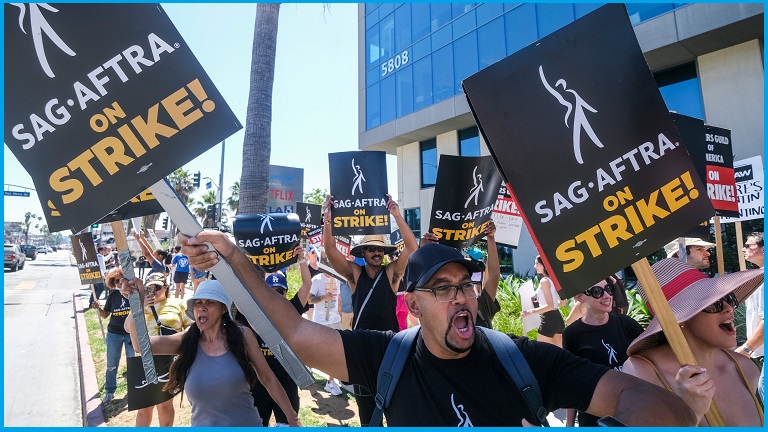More than 150,000 actors in Hollywood have started a labour strike demanding a higher share of revenue from streaming platforms, an increase in minimum contract rates, and a guarantee that actors retain control over how their AI-generated likenesses are used.
Actors’ union SAG-AFTRA announced the strike last week with its president Fran Drescher saying production studios and their trade association the Alliance of Motion Picture and Television Producers (AMPTP) were “on the wrong side of history”.
“At some point, the jig is up. You cannot keep being dwindled and marginalised, and disrespected and dishonored,” Drescher said. “The entire business model has been changed by streaming, digital, AI.”
“If we don't stand tall right now, we are all going to be in trouble. We are all going to be in jeopardy of being replaced by machines and big business.”
According to a report from Variety, the main disagreement is a demand for actors to get two per cent of all revenue generated on streaming shows. They are also negotiating how much to increase minimum rates for actors.
Pandemic-era self-taped auditions are coming under scrutiny with the union claiming they put undue costs on performers.
Importantly, AMPTP and SAG-AFTRA remain conflicted on how to resolve the defining technological issue of our time: artificial intelligence.
Actors want to retain full rights over how their image is used by movie and TV producers and the AMPTP has claimed it is coming to the table on this issue.
The union’s chief negotiator Duncan Crabtree-Ireland disagrees.
“They propose that our background performers should be able to be scanned, get paid for one day’s pay, and the company should own that scan – [the actor’s] image, their likeness – and be able to use it for the rest of eternity in any project they want with no consent, and no compensation,” he said.
In a statement, the AMPTP said called the strike harmful and said it had been negotiating for a “mutually beneficial contract”.
“The AMPTP presented a deal that offered historic pay and residual increases, substantially higher caps on pension and health contributions, audition protections, shortened series option periods, and a groundbreaking AI proposal that protects actors' digital likenesses for SAG-AFTRA members,” the AMPTP said.
“A strike is certainly not the outcome we hoped for as studios cannot operate without the performers that bring our TV shows and films to life.”
The strike is expected to affect production on big budget films like the Avatar and Mission Impossible sequels.
It will compound disruptions that began in May when Hollywood writers began striking in demand of more secure work and for studios to limit the use of generative AI.
The Writers Guild of America said it wants to ensure AI is not treated as a source material to be adapted by writers, nor should it be “considered in determining writing credits”.
“It is important to note that AI software does not create anything,” the Writers Guild said. “It generates a regurgitation of what it’s fed.”
Hollywood actors and screenwriters aren’t the only people concerned with AI taking over their livelihoods.
Voiceover artists and podcasters are increasingly finding contracts they sign contain clauses that give companies rights to use their voices.
One artist who did voiceover work for Microsoft found her voice data been on-sold to another company which was packaging up her specific sound and selling it as part of a broad service for the equivalent of $67 a year.
Spotify reportedly has plans to roll out a feature that will use the voices of its biggest podcasters to generate advertisements.










